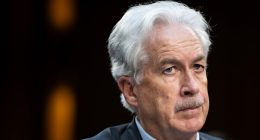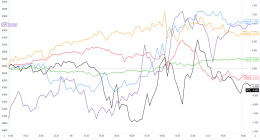
Despite an acceleration in remote work as a result of the pandemic, some companies are mindful that workers can burn out and encourage a good work-life balance.
Photo: Joe Giddens/Zuma Press
Remote work and the acceleration of certain digital projects in 2020 forced chief information officers to reprioritize corporate demands and set new boundaries to prevent team burnout.
In addition to supporting sometimes widely dispersed workforces, many CIOs helped lead their companies’ accelerated digital transformation efforts to meet evolving customer demands in the wake of the pandemic.
Consulting firm McKinsey & Co. in an executive survey found Covid-19 accelerated such corporate digital efforts by three to four years. The global survey, fielded in July, generated nearly 900 responses from C-level executives across a variety of industries and company sizes.
In response to the shifts, CIOs reordered their priorities.

Target Corp. CIO Mike McNamara
Photo: Mike McNamara
Target Corp.’s headquarters workforce became fully remote in March, with its IT team helping the retailer set up about 15,000 employees in their homes. At around the same time, said Mike McNamara, Target executive vice president and CIO, the company was seeing an explosion in digital sales, which were up 282% in April 2020 compared with the same month a year earlier. Mr. McNamara was one of 45 IT executives who responded via email to CIO Journal’s annual end-of-year questionnaire.
At Target, Mr. McNamara said, “system stability became paramount from a tech perspective.”
Target in March put a short-term hard freeze on code deployments and technology changes that didn’t help the company safely buy, move or sell merchandise, Mr. McNamara said. “Any work that didn’t fulfill that purpose and serve our communities by keeping our stores and digital channels up and running was temporarily deprioritized,” he said.
United Airlines Holdings Inc. also did a pivot.
The airlines stopped every project it was working on in early March to determine which were the most critical.
“Gone were long-approval cycles and debates over what were our priorities. If it wasn’t clearly obvious that it was needed, we didn’t do it,” said Linda Jojo, United’s executive vice president of technology and chief digital officer. “[A]nd if it was needed, it needed to be done fast.”
Touchless kiosks, for example, went from being an idea to a prototype in less than 30 days, Ms. Jojo said. The machines let passengers print out luggage tags by scanning the boarding passes on their mobile phones at the kiosks. They don’t have to touch the screen. United started rolling out the kiosks in May, and they are now at more than 300 airports.
But shifting technology demands also brought IT and the business closer together.
“As technology teams become much more integrated into the business and develop deeper business knowledge and expertise…it leads to technology being at the table much more often than in the past,” said Dennis Howard, executive vice president and chief information officer at financial-services firm Charles Schwab Corp.
There’s also a bigger spotlight on IT.
“This crisis has thrust IT teams—often the ‘unsung heroes’ of a business—into the limelight like never before. They have worked to deliver secure, reliable work environments that are keeping employees engaged and productive and business moving in extremely challenging times,” said Meerah Rajavel, CIO at software company Citrix Systems Inc.
But, she said, the company is also mindful that workers can burn out and encourages a good work-life balance. “It’s all about flexibility and trust. We know that life happens—often during work hours—and we let our teams know that it’s OK to be offline for a few hours to manage it,” she said.
Citrix wasn’t the only company paying attention to possible work-related fatigue among its staff.
“At ServiceNow, we’re thinking of creative ways to get employees to disconnect a bit by designating ‘no meeting’ hours, ‘no video’ meetings, and virtual social events where teams can de-stress together,” said Chris Bedi, CIO at the enterprise software company.
Erik Bailey, CIO at Anaqua Inc., said the software company is actively encouraging employees to take days off and spend them away from their computers. “A rested employee is a happy and productive employee,” he said.
Write to John McCormick at [email protected]
Copyright ©2020 Dow Jones & Company, Inc. All Rights Reserved. 87990cbe856818d5eddac44c7b1cdeb8









